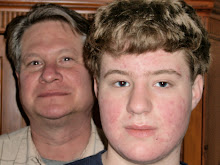Title: The Gauntlet
Released: 1977
Genre: Comic-book cop
Notable for: Making it obvious that Clint had a Yoko
Coolest thing Clint does: Drives a bus through an impossible storm of bullets
Life is full of jokes, and that is our best explanation for what was in Clint's mind when he made "The Gauntlet."
For regular guys, it's like when we pull out a seven-iron for a 210-yard tee shot, or when we pretend the size of our manhood is enormous.
Clint must have found it amusing to make an action film so far beyond believable that the joke is on himself. He becomes a parody of the ultimate action star. At least that's our theory. No matter what Clint had in mind, we're pretty sure he knew his audience would like over-the-top action even it is silly.

Even the movie poster was a ridiculous comic-book styled drawing. A frightened Sondra Locke clings to a ripped and gun-toting Clint (never mind that in the movie she is just as tough as him) with torn clothing revealing flesh seductive enough to qualify as false advertising.
The most basic elements of the plot are standard cop-movie stuff. Clint is a Phoenix detective sent to Las Vegas to retrieve a jail prisoner needed to testify in a trial. He becomes a target for mobsters and police who want his prisoner dead. The prisoner is a woman, and a romance develops.
It sounds like something Dirty Harry could do, but this time Clint is no Dirty Harry. His cop is a drunken loser chosen for the assignment because no one would doubt he could screw it up enough to wind up dead.
Clint eventually figures out his boss expects him to fail. Making it all the way back to Phoenix becomes a personal test of manhood. At the end, he delivers his prisoner to the courthouse by driving a bus reinforced with sheet metal past a gauntlet of cops who open fire.
Action movies never bear up well to strict scrutiny for realism, but "The Gauntlet" makes no effort to appear plausible. So many scenes and story lines are flat-out impossible that Clint had to be laughing. Here are just five examples.
1. Early on, cops open fire on Clint when he is inside Sondra's ranch-style house. They pump out so many bullets the structure collapses. That's a lot of bullets. Luckily Clint and Sondra escape through the secret tunnel that leads from her house into the desert.
2. Vegas casinos take bets on whether Clint and Sondra will make it alive to Phoenix. When the odds are 100-1 against them, Sondra bets $5,000 that they'll make it.
3. Cops are portrayed as mindless robots who gather in large numbers to murder anyone their boss wants dead. Except at the very end, whey they all inexplicably grow a pair and defy orders.
4. The prosecutor is in on the conspiracy to murder his witness, which raises the question: Why did he file the case at all?
5. In the climactic final scene, hundreds of cops fire at Clint's reinforced bus from both sides of a city street, apparently too dumb to notice the danger of cross-fire.
There is much more, but you get the idea.
In real life, "The Gauntlet" ushered in Clint's "girlfriend-movie period." His ill-fated romance with Locke had come to full bloom, and she would become a frequent co-star despite limited box-office appeal. Clint would earn the same sort of pussy-whipped reputation John Lennon received for putting Yoko on "The White Album."
It's good Clint was able to laugh at himself. That's a talent that comes in handy in movies and real life.
Next up: "Every Which Way But Loose."



